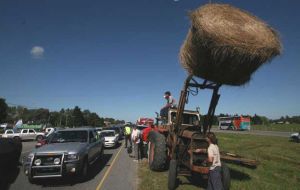MercoPress. South Atlantic News Agency
Argentine officials tell farmers “no dialogue under pressure”
 Road blocks are becaming a source of conforntation
Road blocks are becaming a source of conforntation The Argentine government will not dialogue “under pressure” with striking farmers said Monday Justice minister Anibal Fernandez. Farmers have completed twelve days of surprising successful protests against the government's tax policy on grain, beef and dairy exports.
"The government has decided not to dialogue under situations of pressure such as we are undergoing currently", said Fernandez talking to the Buenos Aires press. Fernandez announcement was made a couple of hours before the four main organizations behind the farmers' protests were to meet to decide on further steps. The leaders of the conflict are meeting strengthened by the massive support from farmers and the announcement of other provinces joining the protest. The conflict began when the Argentine government increased export taxes on grains (27%), oil seeds (41%), beef, dairy produce to ensure treasury resources and a level of prices "acceptable for domestic consumers". Farmers reacted the following day by stopping all activities (outside farm gates) in livestock and grain markets. In certain areas, farmers set up an estimated 30 roadblocks in main highways impeding the traffic of trucks with farm produce. Farmers' organizations anticipated they would consider inviting other movements to join the protest among which university students and the opposition trade unions' organization CTA. The main labor movement CGT and Argentina's Union of Industrialists, benefited with special government compensations, are supporting the administration of President Cristina Fernandez de Kirchner in the conflict. But some seasoned provincial governors feeling the conflict could soon become out of control, and violence erupt, have called for dialogue channels to help find a solution. Juan Schiaretti, governor of Argentina's second most important province, and together with Buenos Aires, Santa Fe, Entre Rios and Tucuman, the heart of the protests called for a "dialogue without conditions" to unravel the conflict. Minister Fernandez said "the government is making decisions to defend the camp and there are sufficient elements to sit and talk about the issues, and arrive to a point that is of interest for everybody", but he insisted no dialogue under pressure. "We have to return to a situation where we can all do the things which helps us without conditioning the other, because if these are the rules of the game, we don't have a chance to talk again, ever", insisted Fernandez. However Fernandez warned about roadblocks and said that security forces will act "in those places where it's not guaranteed the free passage of trucks, whatever they may be transporting; the government's job is to guarantee liberties". The teamster union, loyal to the Cristina Kirchner administration has warned that it could react with violence "if trucks are detained by illegal pickets". Meantime in Buenos Aires and other main cities pressure is growing as supplies of fresh meat, dairy produce and other staple foods become scarce and dearer. Nevertheless in spite of the seriousness of the situation, almost confrontation, the Argentine government has changed since at the start of the conflict the message was "no dialogue" and "no changes to the agriculture export levies policy". Now however it's a more flexible "no dialogue, under pressure".




Top Comments
Disclaimer & comment rulesCommenting for this story is now closed.
If you have a Facebook account, become a fan and comment on our Facebook Page!